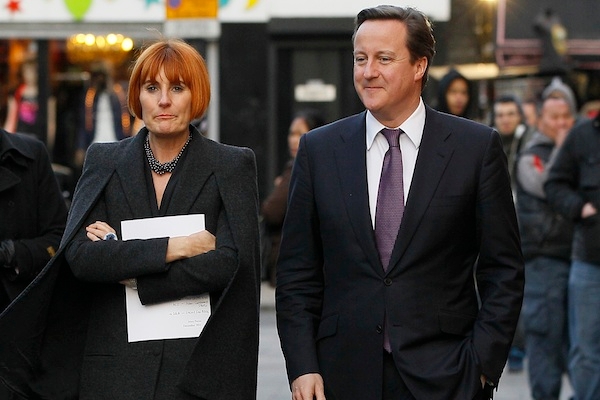On my way to chair a town meeting, I was chuckling over Phillip Warner’s cartoon last week headed ‘Mary Portas reinvigorates the High Street’. First, TV’s sharp-tongued queen of retail holds forth in front of a row of abandoned shops; then townsfolk dance in the street at the news that she has ‘buggered off in a taxi’. Call me an old cynic, but I think turning stars into tsars is a sign of Downing Street desperation: witness Alan Sugar’s lame stint as ‘enterprise champion’ in the dying days of Gordon Brown, and wince at James Caan from Dragon’s Den tackling social mobility. What I heard from the people of my own town, Helmsley in North Yorkshire, was not disappointment at being pipped by Margate and Market Rasen for a place in the first batch of Portas Pilot Towns chosen from ‘371 brilliant individual bids’ — I fear we forgot to post ours — but simple anger over business rates.
Of course the private sector should contribute to the cost of the public provision upon which it depends. But that deal has long been broken: businesses pay separately for essential services such as refuse collection, while rates have risen to levels that are crippling for independent shopkeepers struggling through a five-year downturn against online, out-of-town and rate-exempt charity-shop competition — not to mention the shortage of bank credit.
If you want an even-handed account of this issue, Radio 4’s Face the Facts gave it a good airing on 29 May. But let’s leave balance to the Beeb and go to the nub. Business rates raise £26 billion for George Osborne that he thinks he might otherwise have to take direct from you and me. Small firms in England, unless they qualify for relief, currently pay a ‘multiplier’ of 46p per pound of rateable value, based on 2008 rental valuations. Bigger retailers have their pockets picked too: they pay £1.44 in business rates for every £1 of corporation tax.
Every kind of business is afflicted. My man in the Home Counties motor trade rings from the forecourt to tell me he’s paying £40,000 ‘for which we get precisely
nothing!’
Commercial property values, revenues and profits have slumped since 2008 in desolated town centres across the country. To secure tenants rather than leave premises empty, many landlords accept rents that are lower than the rates payable on the same space. Appeals against outdated valuations take many months to process. Revaluations reflecting economic swings are supposed to happen every five years, but having already pushed the next one to 2015 the government has deferred it beyond the next election to 2017 — for fear, perhaps, of losing small-business voters to Ukip.
Oh no, says communities and local government minister Brandon Lewis — who as MP for Great Yarmouth, which has recently lost a clutch of retailers including Homebase, Dorothy Perkins and JJB Sports, ought to try harder. The deferral is about ‘stability’ for businesses that might otherwise find rates going up, in order to maintain the total tax take, even if rents have gone down. But that would be an absurdly destructive outcome. On the cusp of recovery as we seem to be, a worthwhile across-the-board cut in the business-rates multiplier would swiftly pay for itself — and more — through new jobs, better profits and the taxes they generate. And it might save us all from the pain of Mary Portas.
Let’s get fracking
Great news on the fracking front. A company called IGas says it’s sitting on a huge shale gas reserve deep below Cheshire. Given the company’s ‘most likely’ estimate of 102 trillion cubic feet of gas, and a potential extraction rate of around 15 per cent, that could fulfil five years of UK gas demand, which runs at three trillion cubic feet per year — half of it currently imported. The other leading player in this field, Cuadrilla, has already claimed reserves of 200 trillion cubic feet in Lancashire, so all told (and subject to lots of caveats) that could be 15 years’ worth of fuel to keep us going until new nuclear stations get built and someone designs a wind turbine that works in the lightest of English breezes.
Even better news from IGas chief Andrew Austin is that his discovery lies ‘between the M62 and the M56’. He didn’t say so, but that’s just the sort of place to put a shale gas extraction plant or two; I mean no offence to readers in the industrial belt from Ellesmere Port to Warrington when I say Windsor Great Park it ain’t. So let’s get fracking — ‘get on and drill’, as Peter Lilley MP wrote here recently — while scientists keep working to perfect the alternative energy solutions that will one day free us from carbon dependency.
But that’s not how a cross-party band of rebel MPs sees it: they’ve been busy trying to derail the passage of the Energy Bill by amending it to include a ‘decarbonisation’ target that would effectively kill off gas-fired power generation by 2030, despite the obvious shortage of any other capacity to replace it. With this week’s other parliamentary news story in mind, we can only wonder which ‘fake lobbyist’ is behind this anarchic manoeuvre: could it be Beelzebub, filling backbenchers with misguided green zeal while dancing with glee at the prospect of chaos and darkness to come?
Walled in
Sir Mervyn King — about whom I’ll say more before he departs — referred on Desert Island Discs to ‘hours spent in windowless rooms’ during the financial crisis. It’s an oddity of Sir Herbert Baker’s fortress-like Bank of England that none of the important rooms, including the Governor’s ground-floor office, have outside windows: they all look into an inner courtyard. If King has sometimes given the impression of being cut off, aloof from bankers, markets, politicians and journalists, it may be because he has been psychologically and almost literally walled in. Mark Carney should find a room with a view, or bring a big chisel.







Comments